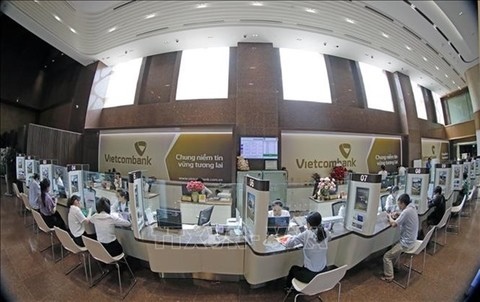|
Debt repayment help for struggling companies to be extended until year end
The State Bank of Việt Nam (SBV)’s proposal to extend Circular 02/2022/TT-NHNN will reduce pressure on enterprises which are struggling to service their debts.

Customers make transactions at Vietcombank’s head office in Hà Nội. Productivity levels are improving so the demand for capital to import production materials is also increasing. — VNA/VNS Photo
|
Circular 02/2022/TT-NHNN, which allows commercial banks to reschedule the debt repayment period and maintain the debt group for certain sectors is proposed to extend to the end of 2024 instead of ending in June.
According to Nguyễn Văn Kết, director of the SKD Vietnam Precision Mechanical Company, productivity is improving, and they have many orders, so they will need additional capital to import materials. He welcomed the government's decision to extend the policy on defining debt terms and, therefore, enable additional borrowing until the end of 2024.
Nguyễn Quang Vinh, the director of Viet Vision Company, agreed and said that the extension of Circular 02/2022/TT-NHNN for another six months is welcome support from the banking industry and the SBV. Within the policy, enterprises will have more time to arrange their debt repayment terms and therefore allow them to improve financial planning and production restructuring.
According to experts, the extension of the policy shows that both companies and banks see that the economy is recovering, but credit demand is not yet really strong. There was concern that if Circular 02 expired in June 2024, the pressure to repay debts would be huge, and those debts could become bad debts.
Banking expert Cấn Văn Lực said the level of bad debt is currently quite high and is likely to continue to increase next year.
Đào Phan Long, a representative of the Việt Nam Association of Mechanical Enterprises, said that extending Circular 02 for another six months was completely reasonable.
“We expect a stronger recovery in the third and fourth quarters of this year. Enterprises that do well will pay interest and repay debts better, thereby reducing bad debts. During the extension time, enterprises will take advantage of the incentive policy to recover. Meanwhile, banks will also have more time to restructure debts and ensure the bad debt ratio is at a regulated level," Long said.
However, experts also believe that while the support policy is necessary, it should not be over extended as the economy is starting to show signs of recovery and capital absorption is more positive. They said the market must be allowed to operate in accordance with commercial laws and principles to avoid affecting the quality of the banks' assets.
Dr. Lê Duy Bình, the CEO of economic consultation provider Economica Vietnam, said enterprises must be self-reliant and anticipate any possible future financial difficulties and plan accordingly. The government can only offer partial support.
If the extension period is too long, it will not be good for the economy as it causes a sharp increase in potential bad debts, which may become future risks. At the same time, it reduces the efforts of enterprises to help themselves, Bình said.
Bizhub
|